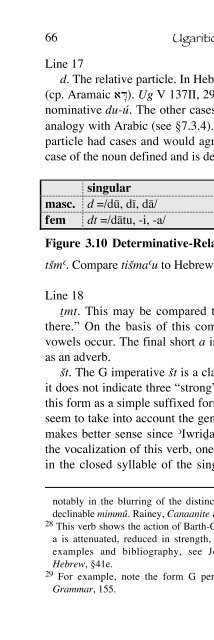A Primer on Ugaritic: Language, Culture, and Literature - enenuru
A Primer on Ugaritic: Language, Culture, and Literature - enenuru
A Primer on Ugaritic: Language, Culture, and Literature - enenuru
Create successful ePaper yourself
Turn your PDF publications into a flip-book with our unique Google optimized e-Paper software.
66<br />
<strong>Ugaritic</strong> <str<strong>on</strong>g>Primer</str<strong>on</strong>g><br />
Line 17<br />
d. The relative particle. In Hebrew, this relative d occurs as …wz/hOz<br />
(cp. Aramaic …a;d). Ug V 137II, 29´ provides the vocalizati<strong>on</strong> of the<br />
nominative du-ué. The other cases are supplied by the problematic<br />
analogy with Arabic (see §7.3.4). Scholars assume that the relative<br />
particle had cases <strong>and</strong> would agree with the gender, number, <strong>and</strong><br />
case of the noun defined <strong>and</strong> is declined as shown in Figure 3.10.<br />
singular plural<br />
masc. d =/duœ, dˆä, daœ/ dt =/duœtu, duœti ?/<br />
fem dt =/daœtu, -i, -a/ dt =/ ? /<br />
Figure 3.10 Determinative-Relative Pr<strong>on</strong>ouns<br />
tsûm{. Compare tisûma{u to Hebrew oAmVvI;t.<br />
28<br />
Line 18<br />
tmt. This may be compared to the Hebrew locative h;DmQAv, “to<br />
there.” On the basis of this comparis<strong>on</strong> the m is doubled <strong>and</strong> a<br />
vowels occur. The final short a is due to the use of the accusative<br />
as an adverb.<br />
sût. The G imperative sût is a classified as a “weak” verb because<br />
it does not indicate three “str<strong>on</strong>g” c<strong>on</strong>s<strong>on</strong>ants. One could interpret<br />
this form as a simple suffixed form, but this interpretati<strong>on</strong> does not<br />
seem to take into account the genre of this letter. 29 The imperative<br />
makes better sense since }Iwridarri is asking for help. Regarding<br />
the vocalizati<strong>on</strong> of this verb, <strong>on</strong>e might posit a short theme vowel<br />
in the closed syllable of the singular <strong>and</strong> a l<strong>on</strong>g vowel in forms<br />
notably in the blurring of the distincti<strong>on</strong> between indeclinable mimma <strong>and</strong><br />
declinable mimmu®. Rainey, Canaanite in the Amarna Tablets, 1:114–18.<br />
28 This verb shows the acti<strong>on</strong> of Barth-Ginsberg’s Law, whereby an /a/ vowel in<br />
aisattenuated, reduced in strength, to an /i/. For a brief descripti<strong>on</strong>, with<br />
examples <strong>and</strong> bibliography, see Joü<strong>on</strong>-Muraoka, Grammar of Biblical<br />
Hebrew, §41e.<br />
29 For example, note the form G perf 2ms sûatta, “you placed,” in Sivan,<br />
Grammar, 155.


